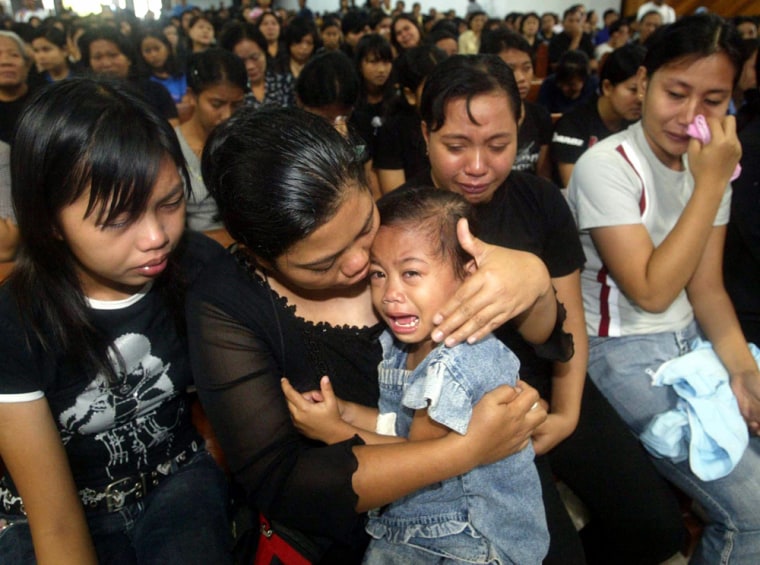Three Christian militants were executed by firing squad early Friday for leading attacks on Muslims six years ago that left 70 people dead, a police official and local media said.
The men were taken before the firing squad at 2:15 p.m. ET Thursday, said a senior police officer who asked not to be identified because he wasn’t authorized to speak to the media. Metro TV and SCTV had similar reports, but did not identify their sources.
Mobs torched cars and police posts in several villages before security forces restored order, said Poso police chief Maj. Rudy Sufahriyadi. Elsewhere they blockaded roads and threw stones at houses and government offices. At least three people were hurt.
In carrying out the death sentence, Indonesia ignored an appeal last month by Pope Benedict XVI to spare the men. A Vatican spokesman, the Rev. Federico Lombardi, told the Italian news agency ANSA that news of the execution “was very sad and painful.”
Fabianus Tibo, 60, Marinus Riwu, 48, and Dominggus da Silva, 42, were found guilty of leading a Christian militia that launched a series of attacks in May 2000 — including a machete and gun assault on an Islamic school where dozens of men were seeking shelter.
Security forces braced for sectarian violence, with thousands of police blocking roads leading to the prison where the inmates are being held, standing on street corners and guarding nearby churches.
“I understand they have been killed,” said Roy Rening, their attorney, adding that he was still awaiting confirmation from the prosecutor’s office.
The case against them has heightened tensions in the world’s most populous Muslim nation and raised questions about the role religion played in punishing those allegedly behind the violence that swept Sulawesi province from 1998 to 2002, killing more than 1,000 people of both religions.
Only a handful of Muslims were convicted in the violence, all for 15 years in prison or less.
Maintained innocence, but ready to die
The men told relatives and a priest during final prayers at their jail Thursday that they were innocent but ready to die.
The planned executions come amid an outcry in many Muslim nations about comments made by Benedict on Islam.
The pontiff last week cited the words of a Byzantine emperor who characterized some of the teachings of the Prophet Muhammad as “evil and inhuman.” He has since said he was “deeply sorry” about the reactions to his remarks and that they did not reflect his own opinions.
The condemned men had said they hoped investigations into the clashes would continue, noting that they had provided authorities with the names of 16 Christians who allegedly instigated some of the worst bloodshed.
The government says its probe is complete.
“My father told me he was not afraid to die, he is not afraid to face his destiny,” said Tibo’s son, Robert. “But he wants the real killers to be caught.”
Trial unfair, rights workers say
Human rights workers say the men’s 2001 trial was a sham, and that while it was possible the men took part in some of the violence, they almost certainly were not the masterminds. Others note that only a handful of Muslims were punished in connection with the violence, all sentenced to 15 years in jail or less.
Thousands of Christians rallied peacefully in at least seven towns Thursday. Muslim protesters also have taken to the streets in recent weeks, demanding the men be killed following two last-minute stays, the most recent just more than a month ago.
Fearing violence timed to the executions, Indonesia deployed more than 2,000 police and soldiers in Palu, some guarding churches that dot the city. Security was also stepped up on the island of Flores, where the three men were born, said Lt. Col. Endang Syafrudin, the island’s police chief.
Access to the prison was cut off late Thursday, with security forces blocking cars and motorcycles on surrounding roads.
Final wishes rejected
Tibo, Riwu and da Silva discussed their final wishes with relatives, lawyers and their priest — from giving a message to President Susilo Bambang Yudhoyono, to having relatives and spiritual advisers accompany them when they are led to their deaths.
The government rejected all of their requests, the men’s lawyer Roy Rening later told reporters.
Their priest, the Rev. Jimmy Tumbelaka, warned that the decision could further stoke tensions.
“It is not good,” he said. “I’m afraid this will only make people angrier.”
Indonesia is a secular nation with the world’s largest number of Muslims, about 190 million. In Sulawesi and several other eastern regions, Christian and Muslim populations are roughly equal.
Though violence in Sulawesi largely ended with the signing of a peace deal in 2002, there have been isolated incidents of violence since then, most blamed on Islamic militants.
Rinaldy Damanik, the head of the Central Sulawesi assembly of churches, called on Christians to stay calm.
“My worry is there will be another bombing or shootings” timed to the executions, he said. “If that happens, then I fear the masses will be uncontrollable.”
